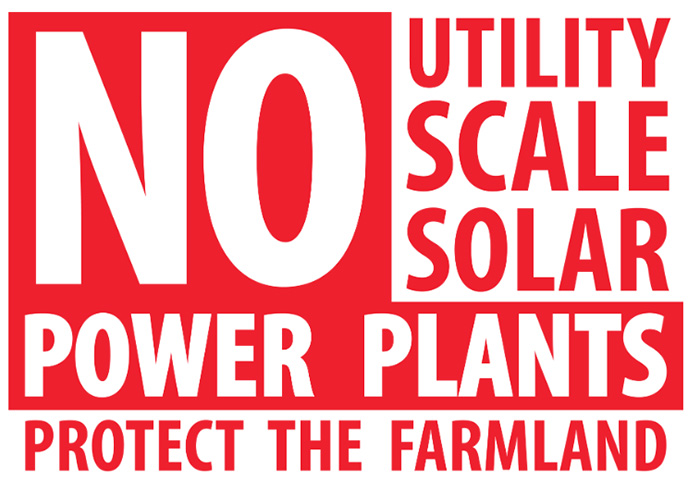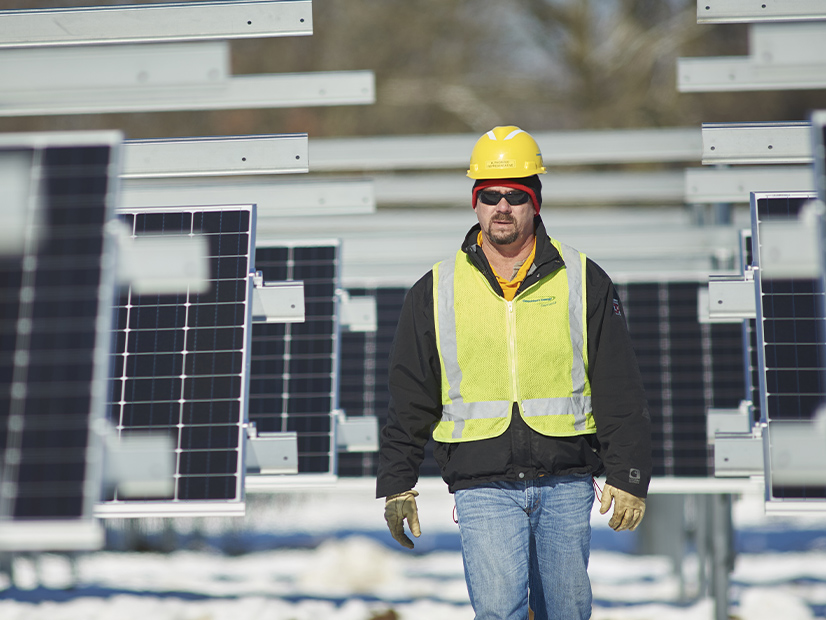LANSING, Mich. — Organizers of a petition drive to ban new, large-scale solar projects on Michigan farmland withdrew their proposal for an initiated law after state officials and opponents warned the language was not specific enough and could shut down projects already in development.
But one of the organizers of Michigan Citizens for the Protection of Farmland said the petition’s language would be redrafted and resubmitted to the Michigan Board of State Canvassers.
The group needs at least 356,958 signatures from registered Michigan voters to place the proposed law before the voters in the 2024 election.
Petition organizer Erin Hamilton told the Canvassers at their April 28 meeting it was not the group’s intent to “create a disastrous situation” that would jeopardize current solar projects.
In a Change.org post, Hamilton said her group was responding to a recent decision by the Michigan Department of Agriculture and Rural Development (MDARD) to allow utility-scale solar on agricultural land enrolled in the department’s Farmland and Open Space Preservation Program.
Hamilton said MDARD’s policy “created a situation where communities without enough commercial or industrial-zoned land available for green power production may have to offer up their farmland, and makes them vulnerable to litigation from massive power corporations, something that America’s farmers and rural communities should never have to worry about.
“We believe that this decision undermines the core purpose of the Farmland and Open Space Preservation Program, which was created to protect our state’s valuable agricultural land for future generations,” she said.
 Michigan Citizens for the Protection of Farmland
Michigan Citizens for the Protection of FarmlandAlthough petition sponsors do not need the Canvassers’ approval of their language, most groups seek it to prevent court challenges that claim the language is impermissibly vague or that the petition fails to meet other state requirements. Such challenges have kept some petition proposals from going before the voters.
The proposal is intended to ban any new solar energy projects in Michigan on property zoned for agricultural purposes. It would not affect the ability of a farmer to install a solar project for personal energy usage. Violators would be subject to fines of $10,000 a day.
Under Michigan’s Constitution, petitions for initiated laws need signatures equal to 8% percent of the vote in the most recent gubernatorial election. If a petition gets enough certified signatures, the legislature has 40 days to enact the proposed law. If the legislature enacts the law, it is not subject to a gubernatorial veto. If the legislature does not enact the law, it would go before the voters.
If the initiated act is approved by the voters, it can only be amended or repealed by a three-fourths vote of the legislature. Voters can also repeal it through another initiative.
Hamilton lives in Livingston County, long one of the most conservative counties in Michigan, which has seen disputes over renewable energy projects in a number of townships.
Fights against renewable energy projects are becoming almost endemic in the state and starting to stretch beyond township boundaries. Clinton County, a largely rural area that includes one of Lansing’s fast-growing suburbs, will consider a proposal in May to enact a one-year moratorium on new renewable energy projects. There has been some discussion, though no proposal, for a countywide moratorium in Shiawassee County, east of Lansing.
In November, voters in Montcalm County rejected a plans for a 75-turbine wind park and recalled the local officials who supported the development. (See Wind, Solar Opponents Defeat Four Proposals In Rural Michigan County.)
On April 19, Michigan Senate Democrats introduced SB 277, which would allow farmland owners to contract for solar projects if there is a development agreement for the land and it meets certain standards in terms of pollinator protection and approved plantings. The bill is part of a package introduced to help the state meet its goal of carbon-neutral status by 2050. (See Michigan Dems Seek to End Coal-fired Plants by 2030.)
The anti-solar proposal before the Canvassers was opposed by environmental groups and others worried about the effect it could have on the state’s adoption of renewable energy. Former Michigan Democratic Chair Mark Brewer, representing the Michigan League of Conservation Voters, said the proposal could kill thousands of jobs in the state developing and maintaining renewable energy projects.
Ed Rivet, of the Michigan Conservative Energy Forum, and Brendan Miller, of the Land and Liberty Coalition, said the petition would strip local control from renewable energy projects and put it in the hands of the state.
CMS Energy told NetZero Insider it will take less than 2% of the state’s existing farmland to meet its goal of adding 8,000 MW of utility-scale solar power by 2040.
Katie Carey, director of external relations, said each megawatt of solar takes between five and 10 acres of “flat, open and treeless land with direct access to the sun.”
“Ideal project sites for utility-scale solar power plants are about 500 to 900 acres and are often comprised of multiple, neighboring landowners. We’re considering potential locations such as farm fields — including those less ideal for growing crops — brownfield sites and publicly owned properties,” she said. “Distance to existing transmission infrastructure is also a critical factor for solar developments. The closer, the better. Lack of access or long distances to high-voltage transmission and distribution can increase costs and other siting issues.”



